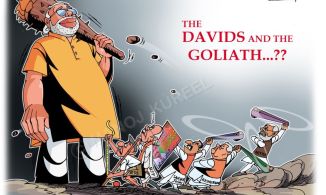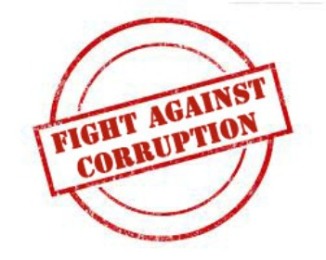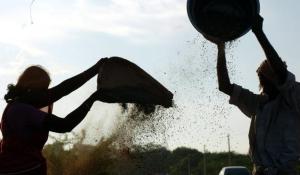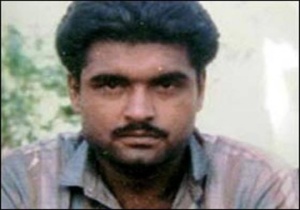By – Shaurya Shekhar – Follow Him on @ShauryaShekhar
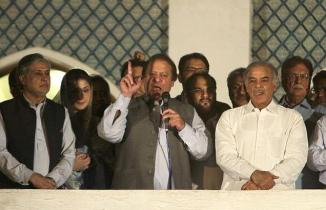
Pakistan Muslim League (N) Leader Nawaz Sharif (centre), flanked by his brother Shahbaz Sharif and daughter Maryam Sharif addresses supporters at a party office in Lahore, after victory
It has been a very important week for Pakistan, some would even call it a milestone- it is the first time a democratically elected Government is passing power to another democratically elected Government.
Now lets put it in perspective:-
Pakistan & India were born on the same day – 15th August 1947. Yet 65 years down the line, they are having their first democratic & fair power transition. India on the other hand has successfully held 15 such Elections & the 16th one is due in 2014.
I feel it is important for us to congratulate the Pakistani people for coming out in such large numbers to vote for ‘change’, while braving the dangers posed to them by the Taliban & other fascist groups too. The public has done its job by casting its vote, the time has now come for us to see how good the ‘change’ will be. How well Nawaz Sharif’s Government will perform remains to be seen. Pakistan is at the moment staring in the face of a default on balance payments, this problem is compounded not only by the energy crisis but also by the environment of lawlessness which exists in the State.
Nawaz Sharif’s past two terms as Prime Minister were very problematic because of a belligerent Army- Sharif has always attempted to clip their wings & the Army has never taken kindly to such attempts. This finally ended in a bloodless coup in 1999, after which the Pakistani Army infiltrated Kargil & initiated a full-scale war.
Nawaz Sharif’s terms as Prime Minister have been characterized by constant trading of barbs between the Prime Minister’s Office & the Office of the Chief of the Pakistani Army. Sharif has always maintained that according to the Constitution, the Prime Minister is the real head of Pakistan & not the Chief of the Army (he stated this again during the Election Campaigning). This will obviously ensure that relations between two of the most powerful offices of Pakistan continue to remain frosty (at least till General Kayani retires).
Mr. Zardari had virtually surrendered the foreign-policy to the Army after an un-cooperative Army under General Kayani threatened to dethrone him too! With General Kayani retiring this year, we can hope for a new, friendly & fruitful relationship to be formed between the new Prime Minister & the new Army Chief, whoever he may be. The Army’s decreasing influence in the foreign affairs & the economy of the country will enable Nawaz to take decisions in the best interests of the country.
Nawaz is also faced with a sputtering economy. The economy has grown at less than 4% per year under the Zardari administration whereas earlier the growth used to be somewhere around 7% per year. The fiscal deficit picture is equally gloomy- the previous Government had hoped to limit it to 4.7% of the Gross Domestic Product (GDP), however, many economists feel that it will zoom past this mark. This problem is aggravated by the energy crisis, which we shall discuss later.
Pakistan is on the verge of defaulting on balance payments, in simple words, they are about to go bankrupt. The only possible way out is another multi-billion dollar loan from either the International Monetary Fund (IMF) or the World Bank, these loans depend on the continuing good relations of Pakistan with the United States of America. Another way out of this mess would be help from India, however, the Army once again has always played spoilsport, they have always been of the opinion that an Indian foothold in their economy in the form of investment would be a huge liability, & would give India an upper hand in negotiations, trade talks & border talks too!
However, the diminishing influence of the Army could mean that Pakistan could try to open up a whole new level of friendship & co-operation by asking India for help. It would also promote regional stability & would help cultivate peace between countries, which have in the past fought 3 bloody wars.
Let us now discuss the energy shortage in greater detail. Pakistan suffers from power cuts of around 18 hours everyday, industries in & around Sharif’s constituency itself have shut down (the case all over Pakistan is similar). Shutting down of industries has also resulted in large-scale unemployment.
No energy means no industries, which in turn means an adverse affect on the country’s economy & we have already discussed how Pakistan’s economy is already on the brink of collapse. Subsidies on energy have sapped the Government’s coffers & are putting a great strain on national finances.
The Iran Gas Pipeline project seems to be the only way out for Pakistan. Pakistan’s own reserves are dwindling & this heightens the importance of quick implementation of the Pipeline Project. They need this Project badly to put an end to their energy woes.
However, this Pipeline comes with it’s own set of problems, it will irk the United States because the Pipeline goes against the sanctions imposed by them on Iran. Pakistan also cannot risk irritating the United States, because they could hold the key to Pakistan’s financial woes. It will be interesting to see how Nawaz walks the tightrope, because correct handling of this Pipeline Project could solve both the problems- energy woes as well as the economy problems.
Nawaz Sharif also faces the prospect of building good relations with Afghanistan, after the withdrawal of American troops. Pakistan’s duplicity, unwarranted ambitions & it’s role in America’s failure in Afghanistan have taken strained the relations. With the United States gone, it would be foolish of us not to expect the Taliban & other terrorist organizations to try & once again make the Pakistan-Afghanistan belt a ‘terror hub’ to export death & destruction. America is leaving behind a war-torn country, which is seething with anger & this makes for a perfect setting for terrorists to set up shop again. Pakistan will have to contribute effectively & constructively for peace to prevail, which will be crucial to the development of Pakistan.
Pakistan is also reeling under a spate of terror attacks. The irony is that the citizens are now victims of something, their own country helped create, had Pakistan been serious about tackling Islamic fascism, we wouldn’t have been faced with this huge problem, which is snatching away innocent lives every other day. Recently, the Army launched offensives against the Pakistani Taliban, who then retaliated with a spate of bomb blasts which left around 130 dead, right in the middle of the Elections. The Pakistani Taliban is single-handedly responsible for the recent spurt in violence & bloodshed in Pakistan, & this needs to be curbed at once. As expected, the Taliban is attacking only the secular liberals who support the recent Army operations, Nawaz Sharif will have to ensure that Pakistan’t tolerance of such extremism comes to an end immediately, he will also have to ensure that Pakistan finally retraces its path, starts afresh on the path of ‘secularism, tolerance & non-violence’.
The most difficult relationship is likely to be with the Americans. Sharif, like almost every other candidate in this election campaign, has risen on a wave of anti-Americanism. His brother Shahbaz Sharif had stopped all projects by the US Agency for International Development (USAID) in Punjab province as a mark of anger against Washington’s policies and its use of drones. The army has its own multi-dimensional quarrels with Washington, especially over the use of drone missiles, which remains to be a huge point of contention. America will obviously support the use of drones because it ensures a reasonable degree of accuracy, without putting their own men at risk. The main losers in the usage of drones are the innocent people living around the targets. For the United States, which has already lost thousands of people in the Iraq war, the ‘drones’ are perfect, they ensure that the Americans remain safe thousands of miles away, while controlling the the deadly birds with the help of a joystick. Pakistan will have to bargain hard if they want to persuade the United States not to use drones. However, Sharif knows that he cannot afford to antagonize the United States too much because he will be needing their support to garner aid from the International Monetary Fund, the World Bank & other global organizations.
Let’s now turn our attention to the elephant in the room- the Kashmir issue. It has dated back to 1947, & has been the cause of two bloody wars (one was fought over Bangladesh). Pakistan has always adopted policies which have resulted in destruction, deprivation & backwardness. In this continued conflict, the Kashmiri people have suffered the most. Whether Pakistan likes it or not, the fact is that the Instrument of Accession was signed by Maharaja Hari Singh & that makes Kashmir an ‘atoot ang’ of India. For the past 65 years, Pakistan has been stuck up over Kashmir, & look where they are. The hatred they have harbored has eaten them from the inside. Its time to move on.
Pakistan is also faced with criticism from one of their staunch supporters- China, which has become increasingly concerned and even privately critical of Pakistan’s pandering to extremism and the Taliban, will now seek an ally in Nawaz Sharif. China is also worried because militant Uighur Muslims from the Chinese province of Xinjiang are still receiving training in Pakistan.
I have just tried to highlight a few problems faced by the new Prime Minister of Pakistan. Blaming India or Afghanistan for helping create Pakistan’s own domestic instability, as former regimes have done, resolves nothing. Pakistan stands isolated and disliked in the neighborhood and rebuilding its reputation is not going to be easy. But I sincerely hope he is more successful than his predecessors.
Wishing Mr. Sharif all the very best!
Thank You For Reading
Shaurya
You can also read this article Here- http://shauryaspeaks.wordpress.com/2013/05/16/challenges-faced-by-nawaz-sharif-in-pakistan/
